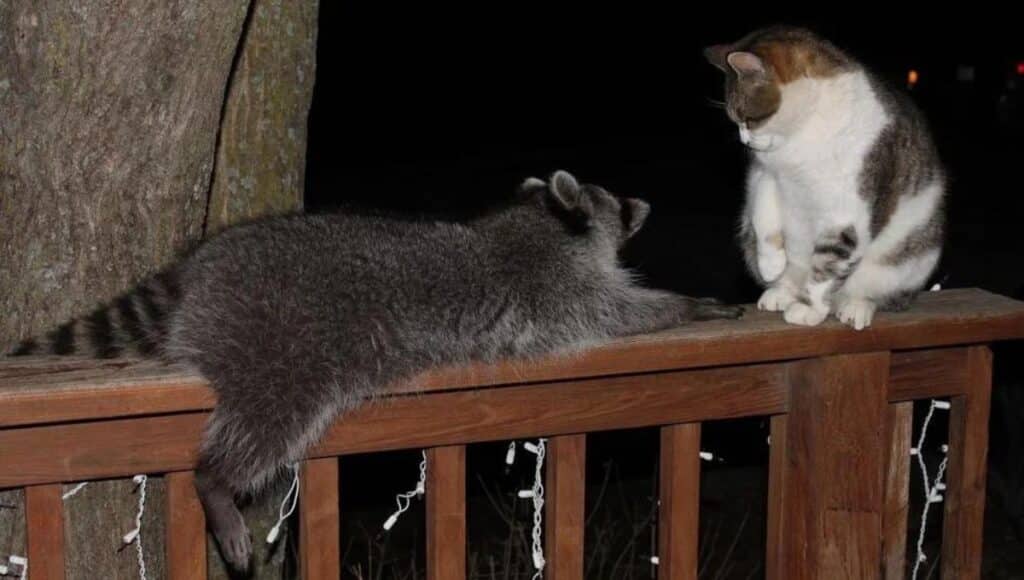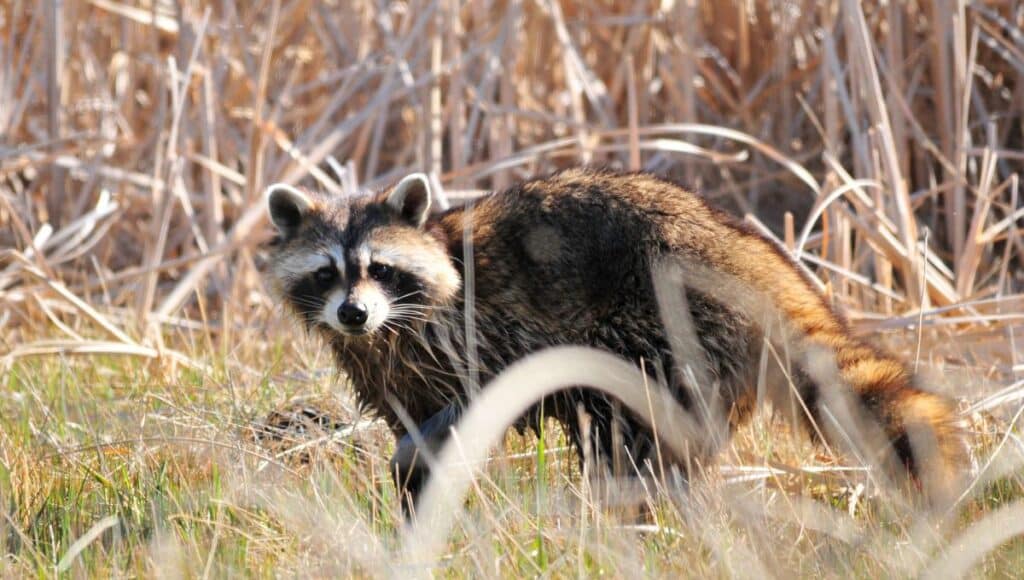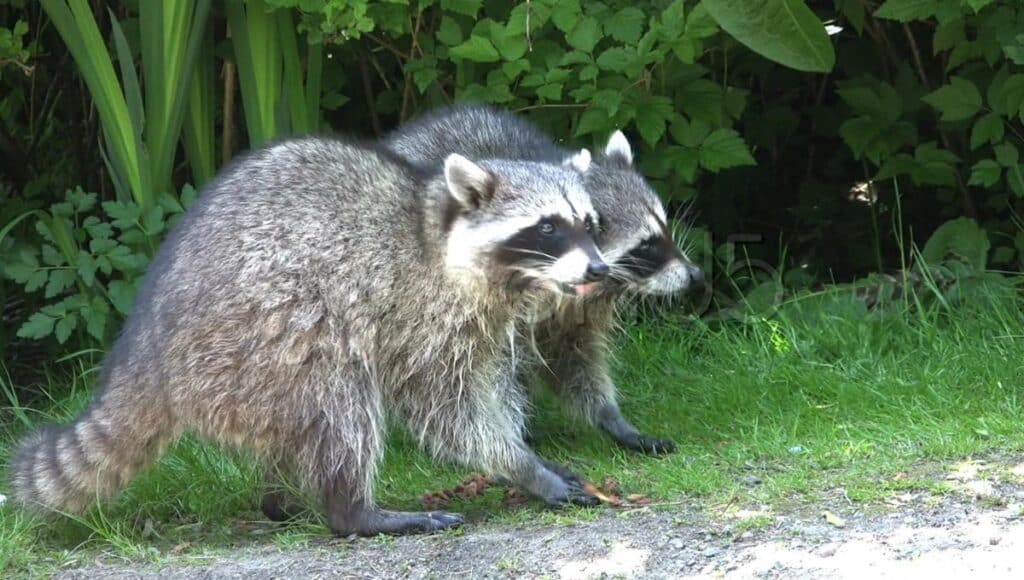While raccoons are often seen as mischievous but endearing urban critters, their omnivorous appetites and fierce hunting abilities raise an alarming question for many cat owners in the US: Do raccoons eat cats? The unsettling truth is that while it’s not a common occurrence, raccoons are opportunistic predators that may prey on cats given the right circumstances.
Understanding a Raccoon’s Diet and Hunting Habits
Raccoons are highly adaptable omnivores, meaning they’ll eat a wide variety of plant and animal matter to sustain themselves. Their natural diet consists of:
- Insects and larvae
- Rodents and other small mammals
- Eggs and nestlings
- Fruits, berries, nuts, and vegetation
- Discarded human food waste
However, raccoons are also skilled hunters and scavengers, with dexterous paws and an impressive ability to break into secure areas in search of food. They’ve been known to prey on pets like chickens and small mammals when easier food sources are scarce.
Factors That Increase the Risk
While attacks on cats are relatively rare, there are certain risk factors that can increase the likelihood of a raccoon preying on a feline companion:
- Lack of Regular Food Sources: When raccoons can’t find enough of their typical diet, they may turn to hunting pets out of desperation.
- Unsupervised Outdoor Cats: Cats that are allowed to roam outside unsupervised, especially at night when raccoons are most active, are more vulnerable.
- Small Cats or Kittens: Smaller cats and kittens make easier prey for a hungry raccoon.
- Mother Raccoons with Young: Protective mother raccoons may perceive cats near their dens as threats to their offspring and attack them.
Horror Stories: Documented Cases of Raccoon Attacks on Cats
While uncommon, there have been several disturbing documented cases of raccoons attacking and even killing pet cats across the US. Here are a few examples:
“My indoor/outdoor cat came home one night with severe lacerations and bite marks. After rushing her to the vet, they confirmed it was a raccoon attack based on the wounds. She barely survived.” – Jessica P., Denver, CO
“I let my two cats out in the backyard for some playtime, and when I opened the door to call them back in, I saw a raccoon dragging my smaller cat away by the scruff of her neck. I scared it off, but she was badly injured and had to be put down due to the extent of her injuries.” – Robert T., Atlanta, GA
While graphic, these anecdotes illustrate the disturbing reality that raccoon attacks on cats, while rare, can and do happen.
What to Do If You Witness an Attack
If you ever find yourself in the horrifying situation of witnessing a raccoon attacking your cat, do not intervene directly. Raccoons can be vicious when threatened and may redirect their aggression towards you.
Instead:
- Make loud noises by banging pots and pans or using an air horn to scare the raccoon away.
- Shine bright lights in the raccoon’s face to disorient it.
- Contact emergency services if the raccoon doesn’t immediately flee.
- Get your cat medical attention as soon as possible, even if injuries don’t appear severe at first.
- Report the incident to your local animal control authorities.
Preventing Conflicts Between Raccoons and Cats

While raccoon attacks on cats can’t be entirely prevented, there are several steps responsible pet owners can take to minimize risks:
- Keep Cats Indoors: Especially at night, keep your cats inside to avoid encounters with raccoons on their nocturnal hunts.
- Secure Outdoor Enclosures: If you do allow supervised outdoor access, make sure any cat patios or enclosures are fully enclosed and raccoon-proof.
- Don’t Leave Pet Food Out: Unsecured pet food can attract hungry raccoons into your yard.
- Use Deterrents: Motion sensor lights and sprinklers can help scare raccoons away from your property.
- Contact Professional Removal Services: If you suspect raccoons have taken up den near your home, contact professional wildlife removal services.
| Deterrent | Description | Effectiveness |
| Motion Sensor Lights | Bright lights triggered by movement can startle raccoons | Moderate |
| Ultrasonic Repellers | Emit high-frequency sounds unpleasant to raccoons | Varies |
| Ammonia-Soaked Rags | The strong smell deters raccoons from entering an area | High |
| Physical Barriers | Fences, enclosed structures prevent raccoon access | High if properly secured |
Remember, being a responsible pet owner means prioritizing the safety of your feline companions from potential predators like raccoons.
How to Identify Raccoon Attack Injuries on Cats
Since raccoons are fierce fighters and cats often struggle to defend themselves, raccoon attacks can result in severe injuries. Here’s what to look for if you suspect your cat has been attacked:
Physical Wounds
- Bite marks and puncture wounds, especially around the neck, head, and back
- Deep lacerations and torn skin
- Missing fur/bald patches from struggling
Behavioral Changes
- Lethargy and loss of appetite
- Excessive hiding/isolation
- Aggression or fear towards familiar humans/environments
If you notice these signs, seek immediate veterinary care, as internal injuries and infections can be life-threatening.
Raccoons and Rabies: Assessing the Risks
One of the most serious concerns around raccoon attacks on pets is the potential for rabies transmission. Raccoons are a prime vector species for the rabies virus across much of the US.
Symptoms of Rabies in Raccoons:
- Aggression and attacking without being provoked
- Foaming at the mouth
- Disorientation and staggering
- Excessive drooling and difficulty swallowing
If you suspect the raccoon that attacked your cat was rabid, report it immediately to local authorities. Your cat may require rabies vaccinations and other treatments.
Humane Wildlife Management: Finding a Balance
While raccoons preying on pets is undoubtedly concerning, addressing the issue humanely is crucial. Lethal methods of raccoon population control remain controversial.
Many animal welfare organizations emphasize exclusion and deterrence strategies such as:
- Securing trash cans and removing food attractants
- Creating physical barriers to denning areas
- Using humane deterrents and hazing tactics
- TNR (Trap-Neuter-Release) programs
Finding an ethical balance between protecting pets while respecting urban wildlife remains an ongoing challenge as cities grapple with raccoon overpopulation.
Raccoon Hunting Laws: Know Your Local Regulations

In certain areas with high raccoon densities, regulated hunting may be permitted as a form of population control. However, raccoon hunting laws vary significantly across states and municipalities.
If considering hunting raccoons near your property:
- Research all relevant local regulations and licensing requirements
- Use humane hunting methods approved by wildlife agencies
- Only hunt outside of raccoon breeding seasons
- Prioritize protecting pets over lethal control whenever possible
Understanding local laws and ethics around raccoon hunting is crucial to address overpopulation responsibly.
Conclusion
The possibility of raccoons preying on cats is an unsettling reality, albeit an uncommon one. While raccoon attacks shouldn’t be cause for panic, they underscore the importance of responsible pet ownership and vigilance.
By taking proper precautions like keeping cats indoors (especially at night), securing outdoor areas, removing potential food attractants, using deterrents, and addressing raccoon denning near homes, cat owners can greatly reduce the risks posed by these opportunistic omnivores.
At the end of the day, an ounce of prevention is worth a pound of cure when it comes to keeping our feline friends safe from raccoons.







